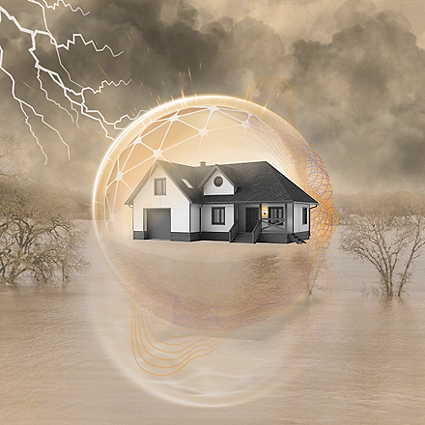🔍Climate-Risk Zones.
Climate-risk zones are geographic areas prone to extreme weather events, such as:
- 🔥 Wildfires (e.g., California, Australia)
- 🌪️ Hurricanes (e.g., Florida, Gulf Coast, Caribbean)
- 🌊 Flooding and sea-level rise (e.g., coastal U.S., UK, Bangladesh)
- 🌾 Droughts (e.g., West U.S., Africa)
- ❄️ Blizzards or cold snaps (e.g., Midwest U.S., Canada)
- 🌀 Tornado-prone zones (e.g., “Tornado Alley” in the U.S.)
These zones are now subject to higher insurance rates, stricter underwriting, and limited provider availability.
🧠 Home Insurance Changing.
Climate change is causing:
- More frequent and severe natural disasters
- Higher claim payouts by insurers
- Increased property damage risk
- Reduced insurer willingness to cover certain areas
🌡️ In 2023–2024 alone, natural disasters caused $250+ billion in insured losses worldwide.
🏡 Homeowners Insurance in Climate-Risk Areas.
It is a standard homeowners insurance policy, often modified or supplemented to cover climate-specific perils, including:
| Standard Coverage | Typical Add-Ons Needed in Risk Zones |
|---|---|
| 🏚️ Dwelling Coverage | ✅ Flood Insurance (not included in standard) |
| 🛋️ Personal Property | ✅ Earthquake Insurance (for seismic areas) |
| ⚖️ Liability Coverage | ✅ Wildfire Endorsements |
| 🏨 Loss of Use (ALE) | ✅ Windstorm / Hurricane Riders |
| 🔧 Structure Repair | ✅ Mold or Water Backup Riders |
💥 Climate-Specific Threats and Insurance Options
🌊 1. Flood Zones
Problem: Regular homeowners policies do NOT cover flood damage.
Solution: Purchase separate flood insurance:
| Option | Description |
|---|---|
| NFIP (USA) | National Flood Insurance Program by FEMA |
| Private Flood Insurance | Higher limits, faster payouts, customizable |
| UK: Flood Re Program | Government-backed pool for flood-prone properties |
💰 Cost: $600–$3,000/year depending on elevation and zone
🔥 2. Wildfire-Prone Areas
Problem: Insurers are withdrawing from high-risk wildfire zones (e.g., California, British Columbia).
Solution:
- Add a wildfire endorsement
- Use state-run FAIR Plans as last resort
- Prove fire mitigation efforts (defensible space, fire-resistant roofing)
💰 Cost increase: Up to 300% over standard premium in high-risk ZIP codes
🌀 3. Hurricanes and Windstorms
Problem: Wind and storm surge can cause billions in coastal losses
Standard home insurance may exclude windstorm or hurricane coverage in risky areas.
Solution:
- Add a Windstorm Rider
- Use named-storm deductibles (typically 2–5% of insured value)
💰 Example: For a $500,000 home, a 5% hurricane deductible = $25,000 out-of-pocket
🌍 4. Earthquake Zones
Problem: Earthquake damage is excluded from most standard policies
Solution: Buy separate earthquake insurance (available in U.S. West Coast, Japan, etc.)
| Provider | Region |
|---|---|
| CEA (California Earthquake Authority) | California |
| GeoVera | U.S. West & Pacific Islands |
| AXA | Global & Europe |
🏢 Top Home Insurance Providers Offering Climate-Risk Coverage.
| Provider | Strength |
|---|---|
| State Farm (USA) | Wind, wildfire, limited flood (via partners) |
| Allstate (USA) | Wildfire defense & risk-based pricing |
| USAA (USA) | Specialized coastal & hurricane packages |
| Aviva (UK) | Optional flood cover, risk-mapping tools |
| Zurich | Multinational property + climate disaster response |
| Neptune Flood | Private flood insurance with high limits |
| Hippo | Tech-driven policies, wildfire + water damage add-ons |
📌 Note: Many insurers are pulling out of risky zones, especially in:
- California (wildfires)
- Florida (hurricanes)
- Louisiana (flood + wind)
- Coastal UK (rising seas)
💸 Premium Costs in High-Risk Zones (2025 Estimates)
| Risk Type | Annual Premium (USD/GBP Equivalent) |
|---|---|
| Flood Only | $600 – $3,000 / £400 – £2,000 |
| Wildfire Zone (California, BC) | $2,500 – $8,000 |
| Hurricane Zone (Florida, Texas) | $3,000 – $10,000 |
| Earthquake Zone | $800 – $3,500 |
| Tornado Alley | $1,200 – $3,000 |
✅ Homes with risk mitigation (sprinklers, raised foundations, shutters) may get discounts
🏗️ How to Qualify for Climate-Risk Insurance
- Get a Home Risk Assessment Report
- Includes flood maps, fire zones, seismic risk, elevation data
- Complete Risk Mitigation Steps
- Fire-resistant roofing
- Sump pumps and French drains
- Storm shutters and reinforced doors
- Backup generators
- Work with Specialized Brokers
- They can access Lloyd’s syndicates, parametric insurers, or private underwriters
- Bundle with Auto or Life Insurance
- May offset rising premiums
🧾 Alternative Options If Denied Coverage
| Option | Description |
|---|---|
| FAIR Plans (USA) | State-run last-resort insurance for wildfire/hurricane-prone homes |
| Flood Re (UK) | UK government scheme helping homeowners get flood insurance |
| Parametric Insurance | Pays out when a specific disaster event happens (e.g., rainfall > 12” in 24h) |
| Self-Insurance | High-risk homeowners create reserves or use captives (for investors/businesses) |
🌱 Climate-Resilient Home Discounts
Many insurers offer discounts if you invest in:
| Feature | Benefit |
|---|---|
| Fire-resistant roofs (metal/clay) | Wildfire risk reduction |
| Elevating home | Flood protection |
| Sealed windows/doors | Hurricane resilience |
| Water sensors | Reduce water damage claims |
| Solar + battery backup | Disaster energy resilience |
📋 Climate-Risk Insurance Checklist
✅ Check your property location (flood/fire/wind zones)
✅ Request a CLUE Report (USA) or Flood Risk Report (UK)
✅ Review deductibles carefully—they’re higher in risky zones
✅ Always check for exclusions in your base policy
✅ Consider multi-policy discounts or usage-based coverage
✅ Ask your insurer about climate mitigation rebates or credits.


